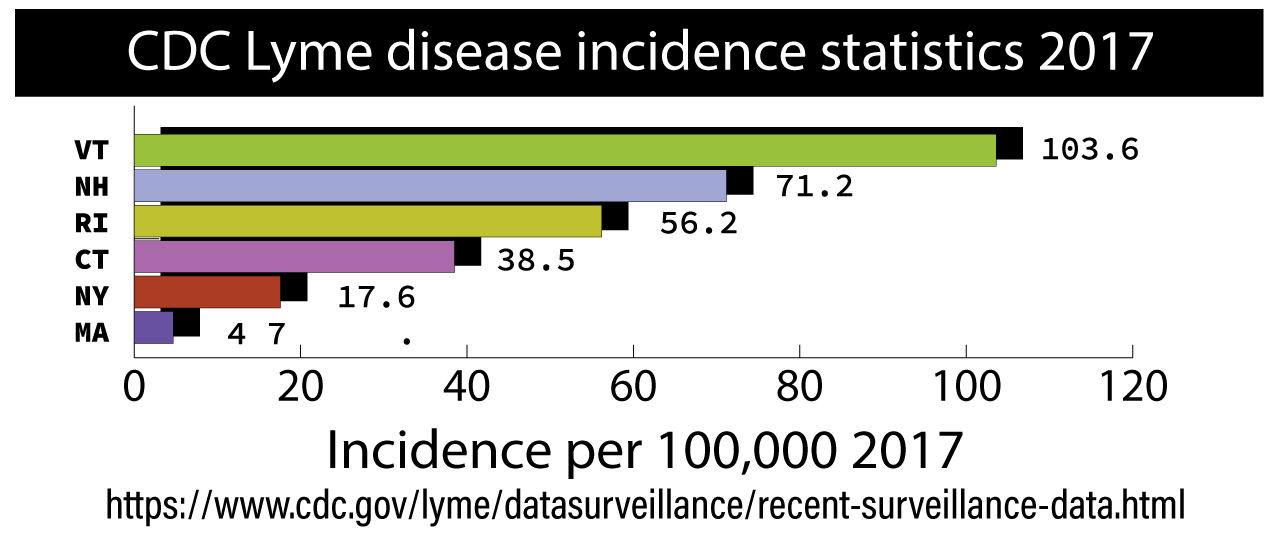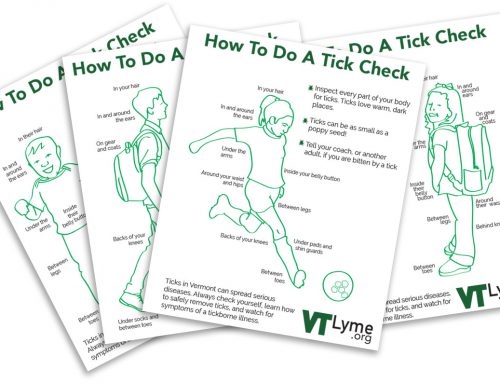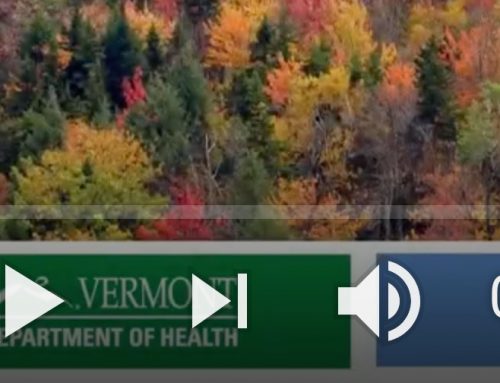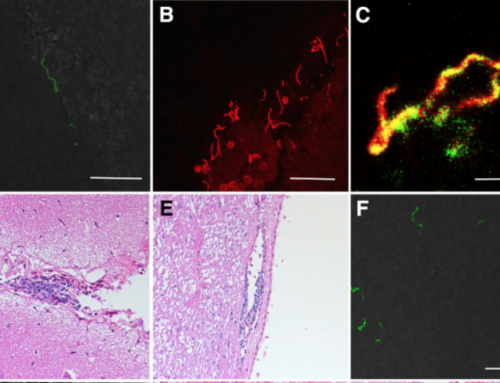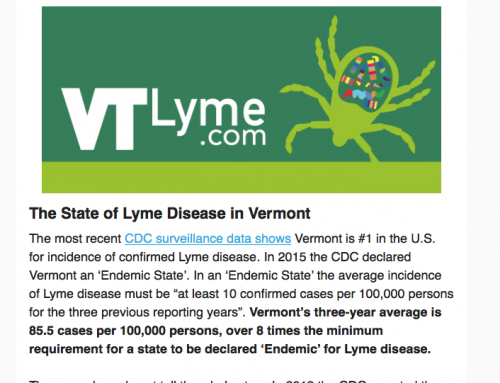VTLyme Spring Newsletter 2019
VTLyme.org has become a 501c3 non-profit organization!
VTLyme.org is the only non-profit organization in our state focused on addressing the impact of Lyme and tick-borne diseases on Vermonters. Please consider supporting VTLyme.org though volunteer hours, or make a donation.
In 2018, VTLyme.org:
- Facilitated support groups
- Sponsored guest speakers
- Distributed resources
- Answered e-mails and phone calls from Vermonters all over the state, providing information about Lyme & TBD’s
- Organized physician education forums
- Maintained and updated the informational website www.VTLyme.org
- Gave free educational power point presentations on tick-borne diseases to public libraries, Rotary Clubs, and private organizations in Vermont
- Published newsletters with information about Lyme and tick-borne diseases and their impact on Vermonters
- Became an official Global Lyme Alliance ambassador, accessing K-12 educational programs to increase public awareness of tick-borne disease prevention.
- Collaborated with the Vermont Department of Health, identifying areas where we can work together to support Vermonters affected by Lyme and TBDs.
State of Lyme in Vermont

Source: https://www.cdc.gov/lyme/datasurveillance/recent-surveillance-data.html
**According to the CDC, “recent estimates using other methods” suggest Lyme disease rates could be ten times the CDC surveillance incidence rates, meaning the actual incidence of Lyme disease in VT may be ten times the 103.6 incidence rate in 2017.
In addition, according the the Vermont Department of Health, cases of other tick-borne diseases such as Babesiosis and Anaplasmosis continue to steadily increase in Vermont. Some tick-borne diseases require a different treatment than Lyme disease, making timely and accurate diagnosis and treatment important.

8 things to Remember About Lyme disease in VT
- Not everyone gets a rash
According to the National Institutes of Health, “The most distinct symptom of Lyme disease—the circular red rash known as erythema migrans (EM)—does not appear in at least one quarter of people who are actually infected with Lyme bacteria.” In Vermont, recent data shows the incidence of EM rashes has been falling in Vermonters diagnosed with Lyme disease. - It’s not just Lyme disease
According to the VT Department of Health, Anaplasmosis, Babesiosis, Ehrlichiosis, Borrelia miyamotoi and Powassan Virus are all present in Vermont. Some of these tick-borne diseases may require a different treatment than Lyme disease. - Lyme disease can be diagnosed 12 months of the year
VT Department of Health data shows confirmed cases of Lyme disease are diagnosed all 12 months in Vermont. The most cases are diagnosed May – September.

- Blood tests might not work.
Because it may take weeks for antibodies to develop, according to the CDC, “testing an infected person too early can produce a negative result”. False positive tests can also occur.The VT Department of Health notes,“Even the best available Lyme testing is imperfect and should be interpreted in the context of the patient’s clinical presentation.” - A person may have symptoms weeks, months, or years after being bittenTreatment failure does occur. Vermonters with disseminated Lyme disease may need a different treatment than those in an early stage of the disease with an early diagnosis. Other tick-borne infections, such as Babesia, may require a different approach than Lyme disease.
- Not all ticks carry Lyme disease
Only four of thirteen tick species in Vermont are known to carry pathogens. One of these four is responsible for 99% of all tick-borne diseases reported in Vermont – the blacklegged tick.The VT Department of Agriculture 2018 tick report showed over 60% of the ticks tested positive for at least one disease. 56.7% were positive for Borrelia burgdorferi, which causes Lyme disease. 8.25% were positive forAnaplasma phagocytophilum (Anaplasmosis), 1.03% for Babesia microti (Babesiosis), 1.03% for Borrelia miyamotoi, and 1% for Powassan Virus. Approximately 5% of the ticks tested positive for two or more pathogens.Remember, just because you have been bitten doesn’t mean you have a tick-borne disease, and correctly identifying the type of tick that bit you will help you understand your risk of infection. - Vermont has a lot of Lyme disease
Vermont regularly tops US states for incidence of Lyme disease. The most recent CDC surveillance numbers show Vermont’s incidence per 1000,000 people is 103.6.For comparison, the incidence rate in Connecticut was 38.5, New York’s was 17.6, and Massachusetts rate was 4.7.In 2017 Maine was the only state with a higher incidence than VT, at 106.6.The CDC designates a state a “High Incidence State” when there is an average incidence of at least 10 confirmed cases per 100,000 persons for previous three reporting years. Vermont’s 3 year incidence rate is 86.7 per 100,000 persons.
- Lyme can affect mood, cognitive performance, and mental health
According to the Global Mental Health Program at Columbia University “significant cognitive and psychological symptoms are being recognized as part of the symptom pattern associated with untreated and/or chronic Lyme Disease”.Depression can be a component of Lyme disease. Case studies show symptoms of Lyme disease can be similar to symptoms of schizophrenia or bi-polar disorder. Research has also shown a possible connection between Lyme disease and suicidality.In children, Lyme disease may appear as a learning disability, difficulty with processing, self-harming behavior, or ADHD. Learn more about Lyme and mental health at VTLyme.org.
Can You Donate $10?
VTlyme.org is applying for grants to better support Vermonters affected by Lyme and tick-borne diseases. We need to show we have community support! Please donate $10 to VTLyme.org on Go-Fund-Me.
May is LD Awareness Month
VTLyme.org will be working to increase awareness of the effects of Lyme and tick-borne diseases on Vermonters. The Lyme Disease Association has offered VTLyme.org an educational grant. We will be using this grant to provide new and updated prevention and education materials and resources.
2019 Support group dates
The Burlington area Lyme Disease Support Group offers facilitated discussions about strategies and resources for living well with tick-borne illness. All are welcome including anybody supporting those with Lyme and TBD.
Upcoming 2019 Dates: May 5th • June 9th • August 25th • September 8th • October 13th • November 10th
Location: PT 360, 426 Industrial Avenue, Williston VT.
Time: 1pm-3pm
Contact Information: [email protected]
There have been additional tick-borne disease support groups in Addison County and Central Vermont. If you would like to learn more, facilitate a support group, or be listed as a resource on VTLyme.org, please contact us.
Volunteers Needed!
In 2018 VTLyme.org grew from a one-person effort, into a 501c3 non-profit organization with a dedicated board. Now, to achieve our goals, WE NEED YOU! If you would like to help, please contact us. Our all-volunteer organization needs help with Lyme disease prevention efforts in public school, and other projects to prevent and increase awareness of tick-borne diseases in Vermont.
Donate
As a new non-profit, and the only organization in Vermont addressing the impact of tick-borne diseases, VTlyme.org will be fundraising and welcoming corporate sponsors. Please consider making a tax deductible contribution to VTLyme.org, or contribute $10 on GoFundMe.
Why This Work is Important:
In early 2017 we published a chart showing inconsistencies in information about Lyme disease as reported in Vermont media from 2014-2016. A recent review in 2019 shows that even among medical and science professionals there is still confusion about Lyme disease in Vermont.
Our Mission at VTLyme.org:
VTLyme.org is committed to providing effective prevention education, equitable information, and support for Vermonters affected by Lyme and other tick-borne diseases.
- Educate Vermonters, and Vermont’s children, about how to prevent tick-borne diseases and increase awareness of the wide-ranging symptoms of tick-borne illnesses.
- Provide Vermonters access to accurate and updated information about the diagnosis and treatment of tick-borne diseases.
- Encourage Vermont’s medical providers to gain knowledge and expertise in the diagnosis and treatment of Lyme and tick-borne diseases.
- Provide dependable support and resources for individuals and families in Vermont affected by tick-borne illnesses.
VTLyme.org aims to offer unbiased and accurate news about tick-borne disease in Vermont, and information about local resources including support groups. Your feedback is encouraged and welcome!

